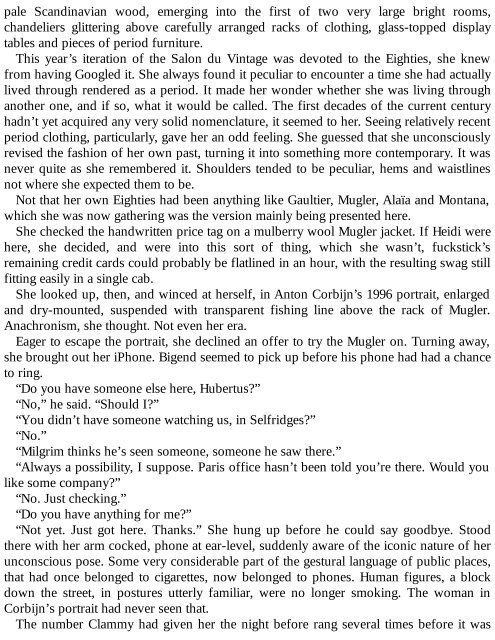- Page 2 and 3:
TITLES BY WILLIAM GIBSON Neuromance
- Page 4 and 5:
VIKING an imprint of PENGUIN BOOKS
- Page 6 and 7:
1. CABINET 2. EDGE CITY 3. SLUT’S
- Page 8 and 9:
45. SHRAPNEL, SUPERSONIC 46. TORTOI
- Page 10 and 11:
To Susan Allison, my editor
- Page 12 and 13:
accommodations. A peculiarly narrow
- Page 14 and 15:
They’d run with that tallness, em
- Page 16 and 17:
2. EDGE CITY Milgrim considered the
- Page 18 and 19:
lot. They always made that squealin
- Page 20 and 21:
positioned pocket, quite far down o
- Page 22 and 23:
3. SLUT’S WOOL She woke to gray l
- Page 24 and 25:
The Italian girl brought her a pot
- Page 26 and 27:
“Fully.” He forked baked beans
- Page 28 and 29:
small army of people who understand
- Page 30 and 31:
Milgrim preferred to regard that by
- Page 32 and 33:
public toilets as remarkably semico
- Page 34 and 35:
No exterior signage. The label, ins
- Page 36 and 37:
advanced, but the promise of it had
- Page 38 and 39: 6. AFTER THE GYRATORY The Neo’s p
- Page 40 and 41: Milgrim nodded, looking around at t
- Page 42 and 43: 7. A HERF GUN IN FRITH STREET Bigen
- Page 44 and 45: “Aldous will take you back to the
- Page 46 and 47: 8. CURETTAGE Milgrim, cleaning his
- Page 48 and 49: 9. FUCKSTICK When she opened Cabine
- Page 50 and 51: of darts in her life, but didn’t
- Page 52 and 53: interesting, required volunteers, t
- Page 54 and 55: system. Then back, without exiting,
- Page 56 and 57: squirrel suit. He was okay. Hot, to
- Page 58 and 59: and splashed it into the sink. She
- Page 60 and 61: “How so?” “Are they serious a
- Page 62 and 63: to the hotel. We’ll phone you.”
- Page 64 and 65: “Hollis?” She looked up. “Mil
- Page 66 and 67: something he pointed out to me, in
- Page 68 and 69: 15. THE DROP Fitzroy,” Clammy sai
- Page 70 and 71: “What were the other people like,
- Page 72 and 73: 16. HONOR BAR She was waiting for M
- Page 74 and 75: founder and CEO.” “CEO,” he r
- Page 76 and 77: “No,” Milgrim agreed, and took
- Page 78 and 79: “But it was your rule, remember?
- Page 80 and 81: 18. 140 The Neo rang while he was s
- Page 82 and 83: 19. PRESENCES Tossing makeup and to
- Page 84 and 85: 20. AUGMENTED Milgrim glanced up fr
- Page 86 and 87: “I know another Bollard, plus the
- Page 90 and 91: She’d actually seen suits like th
- Page 92 and 93: She stepped back into the elevator,
- Page 94 and 95: His therapist had suspected that hi
- Page 96 and 97: his camera. Now it was Foley’s tu
- Page 98 and 99: And two more black-suited minders.
- Page 100 and 101: “Were you ever a model?” “No,
- Page 102 and 103: sense of what she didn’t like tha
- Page 104 and 105: The Neo rang, from a different pock
- Page 106 and 107: he put his phone in his jacket pock
- Page 108 and 109: “Depends how much it matters to h
- Page 110 and 111: 26. MOTHER RUSSIA Kleenex?” Milgr
- Page 112 and 113: strap of his bag was securely over
- Page 114 and 115: When the elevator stopped again, an
- Page 116 and 117: “Found a gym. Hacky.” “Hackne
- Page 118 and 119: 28. WHITE PEAR TEA The cost of wifi
- Page 120 and 121: “Borrowed laptop. Lost phone.”
- Page 122 and 123: 29. SHIVER Sleight,” Bigend said,
- Page 124 and 125: 30. SIGHTING Milgrim left the white
- Page 126 and 127: In Basel, they had questioned him c
- Page 128 and 129: lobby. Outside, the air had been sc
- Page 130 and 131: seen him. He smiled ruefully, white
- Page 132 and 133: 32. POST-ACUTE The waitress was dep
- Page 134 and 135: Hounds haven’t often done things
- Page 136 and 137: haven’t been sold off, otherwise
- Page 138 and 139:
“Blue Ant didn’t send anybody.
- Page 140 and 141:
33. BURJ She got the iPhone out of
- Page 142 and 143:
“Bye, Heidi.” The pale gold bul
- Page 144 and 145:
Imagining explaining that to Winnie
- Page 146 and 147:
“Would he have to know?” “Did
- Page 148 and 149:
35. DONGLE As the train pulled out
- Page 150 and 151:
was heavier than he would have expe
- Page 152 and 153:
“A roll-in. Vinegar and brown pap
- Page 154 and 155:
“That’s less dangerous?” “N
- Page 156 and 157:
37. AJAY Inchmale’s spirit-beast,
- Page 158 and 159:
“ ‘Engrish,’ ” said Heidi,
- Page 160 and 161:
38. GETTING HOTTER Bigend was havin
- Page 162 and 163:
“I don’t know what he thinks,
- Page 164 and 165:
“Give it a speed-dial code,” sa
- Page 166 and 167:
40. ENIGMA ROTORS His room here ove
- Page 168 and 169:
unfamiliar. Voytek wore a wool card
- Page 170 and 171:
“Toilet. Loo.” “In back. With
- Page 172 and 173:
He held the door for her. “Welcom
- Page 174 and 175:
“Because of who and what they see
- Page 176 and 177:
hurt would constitute a dropped bal
- Page 178 and 179:
“That’s bad for you?” She loo
- Page 180 and 181:
“Not quite. He becomes a hookup a
- Page 182 and 183:
43. ICHINOMIYA Thanks for meeting o
- Page 184 and 185:
any more. I’ll understand.” Mer
- Page 186 and 187:
“Good,” said Milgrim, before Bi
- Page 188 and 189:
“I don’t think he did either, m
- Page 190 and 191:
“I don’t think he’d like that
- Page 192 and 193:
The tall woman’s large, startling
- Page 194 and 195:
military contracts, at least it is
- Page 196 and 197:
ut the manta, merely a black, devil
- Page 198 and 199:
Something moved, three feet above B
- Page 200 and 201:
And Milgrim fell, amazed and unthin
- Page 202 and 203:
49. GREAT MARLBOROUGH All was forwa
- Page 204 and 205:
50. BANK-MONUMENT Milgrim had never
- Page 206 and 207:
51. SOMEONE Hollis lay fully dresse
- Page 208 and 209:
ear lobby, do some work on my lapto
- Page 210 and 211:
yours. Total fanboy.” “That wou
- Page 212 and 213:
cushioned. “Archaic expression,
- Page 214 and 215:
“You told her that?” “And she
- Page 216 and 217:
“The food?” “What they manage
- Page 218 and 219:
53. CRICKET The phone’s cricket-n
- Page 220 and 221:
54. AIR GLOW Ferguson,” said Winn
- Page 222 and 223:
55. MR. WILSON There were few guest
- Page 224 and 225:
“Milgrim.” “How much does he
- Page 226 and 227:
56. ALWAYS IS GENIUS Milgrim, on hi
- Page 228 and 229:
“You refer,” Bigend said, “to
- Page 230 and 231:
58. DOUCHE BAGGAGE Voytek was very
- Page 232 and 233:
toward one wall, raising the racket
- Page 234 and 235:
under her majorette jacket. “Look
- Page 236 and 237:
60. RAY Milgrim, in his stocking fe
- Page 238 and 239:
“You and that Heidi,” said Fion
- Page 240 and 241:
“A sigil?” “The sigil of forg
- Page 242 and 243:
62. WAKING Milgrim woke with a leg
- Page 244 and 245:
63. CURLY STAYS, SLOW FOOD With Gar
- Page 246 and 247:
filigreed instrument Inchmale had u
- Page 248 and 249:
64. THREAT MANAGEMENT The toilet in
- Page 250 and 251:
“Did you have story time first?
- Page 252 and 253:
65. LEOPARD SKIN IN MINIATURE She s
- Page 254 and 255:
There was something on the bedside
- Page 256 and 257:
66. ZIP Benny’s civilian bike, Mi
- Page 258 and 259:
“We saw him,” Fiona said. “He
- Page 260 and 261:
67. A CRUSHED MOUSE Ajay, looking p
- Page 262 and 263:
translucently ancient waxed cotton
- Page 264 and 265:
68. HAND-EYE Now it was Milgrim’s
- Page 266 and 267:
69. THE GIFTING SUITE Here?” She
- Page 268 and 269:
keeping this on. I’m doing someth
- Page 270 and 271:
70. DAZZLE The penguin smelled of K
- Page 272 and 273:
couldn’t identify at all. “I’
- Page 274 and 275:
“That’s for you to work out. A
- Page 276 and 277:
and Heidi, and you and the others,
- Page 278 and 279:
he’s sleeping with Hollis. I mean
- Page 280 and 281:
Milgrim lowered the helmet to his s
- Page 282 and 283:
“I’m sorry,” he said. “What
- Page 284 and 285:
73. THE PATCHWORK BOYFRIEND In the
- Page 286 and 287:
74. MAP, TERRITORY The heels of Mil
- Page 288 and 289:
“I’m not going anywhere without
- Page 290 and 291:
76. GONE-AWAY GIRL Milgrim stood, f
- Page 292 and 293:
77. GREEN SCREEN The broken wheel o
- Page 294 and 295:
“Did you finish your Breast Chase
- Page 296 and 297:
78. EL LISSITZKY Care for mineral w
- Page 298 and 299:
unless you’re right up on somethi
- Page 300 and 301:
Pep, following instructions, hadn
- Page 302 and 303:
And then he found Chombo, and Foley
- Page 304 and 305:
82. LONDON EYE Thumbing the wings t
- Page 306 and 307:
83. PLEASE GO What was that?” she
- Page 308 and 309:
84. NEW ONE Fiona’s drone’s bat
- Page 310 and 311:
okay?” she’d asked, giving his
- Page 312 and 313:
getting him wherever he’s now got
- Page 314 and 315:
painfully with the orange leather u
- Page 316 and 317:
now.” “At Blue Ant?” Aldous n
- Page 318 and 319:
THANKS: My wife Deborah and daughte
- Page 320:
45. SHRAPNEL, SUPERSONIC 46. TORTOI



